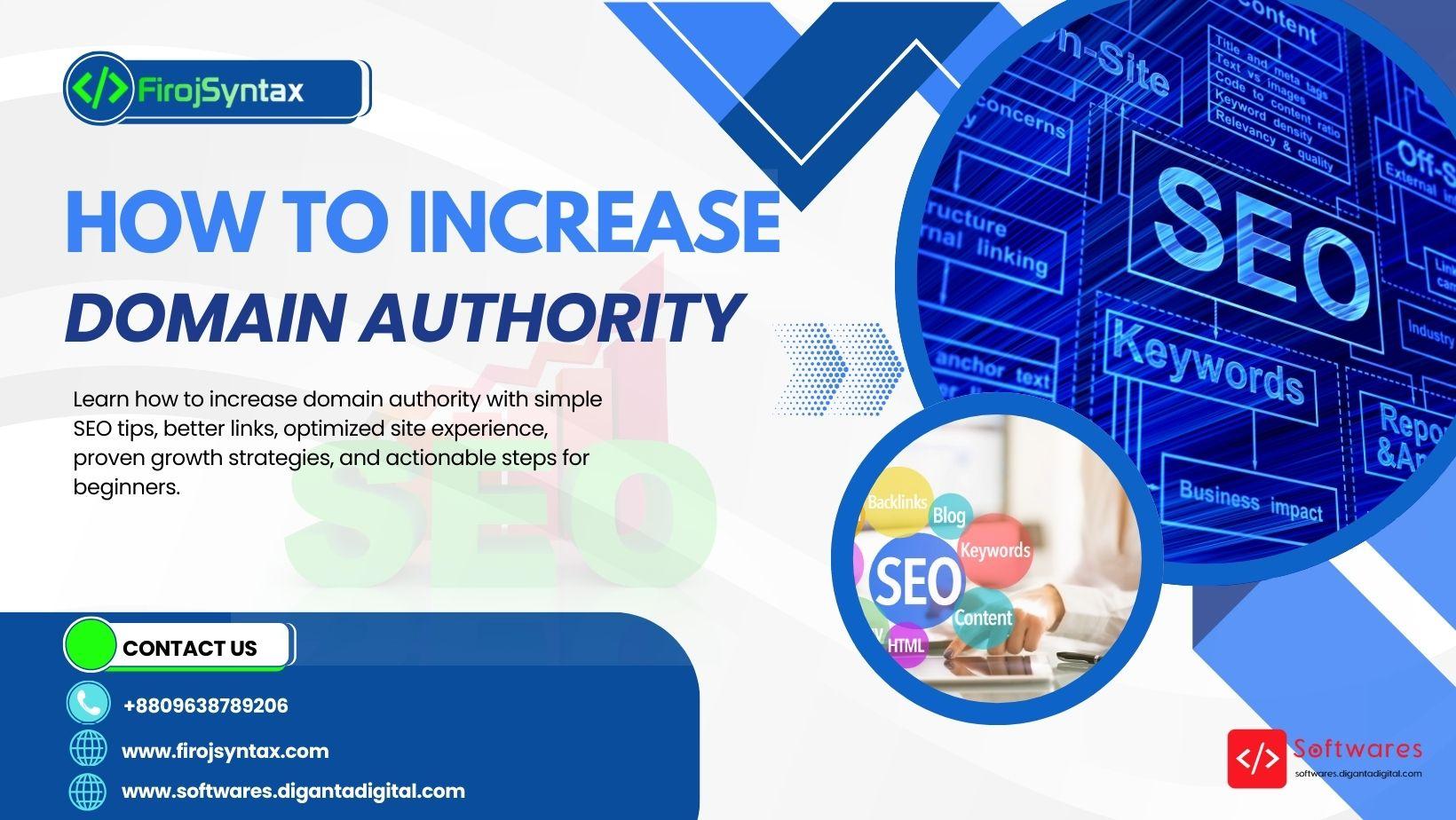Learn how to boost domain authority with quality backlinks, smart SEO, and site improvements. A beginner’s guide to improving rankings and trust.

If you've ever wondered how to increase domain authority and get your site noticed, you're not alone. I remember staring at my analytics, frustrated that Google barely cared even after I wrote good content. That's when I realized domain authority isn't just about publishing it's about improving site experience, removing toxic links, and using optimized on-page SEO formulas that send the right signals.
Think of your website as a house: backlinks are the bricks, internal linking and topic clusters are the rooms, and the overall experience is the cozy vibe that makes guests stay. Once I started building and auditing backlinks carefully and structuring my content with smart internal linking, my rankings began to climb and so did reader trust.
In this guide, I'll break down the steps that worked for me, so you can avoid trial-and-error and focus on strategies that build authority. Stick around, and you'll walk away with a clear, beginner-friendly roadmap to grow stronger online visibility.
If there's one lesson I learned the hard way, it's that users notice everything even the little things. A slow website or a messy layout can scare people away faster than you think. When I started, I focused too much on keywords and ignored the user experience. The result? High bounce rates and zero trust.
Improving site experience is like welcoming guests into your home you want it clean, easy to navigate, and inviting. This means fixing broken pages, speeding up load times, and ensuring your site works well on mobile. At the same time, you need to remove toxic links. I once ignored a batch of spammy backlinks pointing to my site, and Google punished me. A quick backlink audit and disavow file turned things around.
Consider site experience and link health as your foundation to increase domain authority. Without them, no amount of content or backlinks will save you. Start here, and you'll notice a real difference in how search engines and people view your site.
On-page SEO was just about stuffing keywords into titles and meta tags. But over time, I realized it's more like fine-tuning an instrument you want harmony, not noise. Optimized on-page SEO formulas give your content structure and clarity so Google can understand it better.

For example, I started breaking my posts into clear H2 and H3 headings, using keywords naturally in titles, and writing meta descriptions that spoke directly to readers. I also learned the power of alt text for images it helps with SEO and accessibility simultaneously. These small tweaks made my articles more visible and easier to rank.
Don't overlook the basics when figuring out how to increase domain authority. Strong on-page SEO signals tell Google that your content is relevant and trustworthy. It's like dressing well for an important meeting you're showing up prepared, polished, and ready to be taken seriously.
When I first launched my site, my articles lived like strangers no connection, no direction. That changed the day I discovered the power of internal linking and topic clusters. Think of your website as a city. If streets don't connect, visitors get lost. Internal linking guides them from one place to another smoothly.
I started grouping content into clusters one main "pillar" post and several supporting articles linked around it. For example, I wrote a big guide on SEO and connected smaller posts on keyword research, backlinks, and technical fixes. Not only did this help users find more relevant content, but it also signaled to Google that my site was an authority on the subject.
Don't let your articles stand alone if you want to increase domain authority. Build a web of connections with internal linking and topic clusters. This will keep readers engaged longer and show search engines that you know your stuff inside out.
Backlinks are like votes of confidence. When a trusted site links to you, it's as if they're saying, "Yes, this content is worth reading." Early on, I chased every link I could find even low-quality ones. That was a big mistake. Those links dragged my site down instead of lifting it.
Now, I focus on building quality backlinks . My go-to methods have been guest posting, collaborating with other creators, and sharing insights on niche forums. I also audit my backlinks regularly, removing harmful ones and keeping track of valuable ones. Maintaining a garden is like pulling out the weeds and watering the healthy plants.

If you're serious about how to increase domain authority, backlinks can't be ignored. But remember, it's not about numbers it's about trust. A few links from respected sites are worth more than hundreds from shady corners of the web.
Here's the part most beginners don't want to hear: increasing domain authority takes time. I remember checking my DA score daily, hoping for an overnight jump. But just like fitness or language learning, progress shows up with consistent effort, not quick hacks.
Keep publishing quality content, optimizing your site , and building relationships. The results may feel slow at first, but one day, you'll look back and realize your site has become stronger, more trusted, and more visible than ever.
If you're wondering how to increase domain authority without burning out, remember this: it's a marathon, not a sprint. Stay patient, stay consistent, and the authority you build will be long-lasting.
Ever felt lost while reading a blog where every post feels like an island with no bridge to the next? That was me in my early blogging days. I wrote dozens of posts, but none of them connected. Google didn't know what my site was about, and honestly, neither did my readers.
That's when I discovered the power of internal linking and topic clusters . Think of it like organizing a library. Each section has related books grouped together, making it easy for readers (and search engines) to find what they need. My site suddenly had structure and flow when I started linking my related posts.
The best part? My bounce rate dropped, readers stayed longer, and Google rewarded me with better rankings. Don't skip this step if you're figuring out how to increase domain authority . Start by linking older articles to newer ones, group them by themes, and create a "pillar page" that ties everything together.
So, next time you publish, ask yourself: Does this post connect to another piece of my content? If the answer is yes, link it. If not, create a post that bridges the gap. Trust me, your site will feel stronger and more trustworthy overnight.
| Topic | Key Points / Lessons | Action Steps |
|---|---|---|
| Backlinks Misconception | Thought more backlinks = better rankings. | Avoid spammy links; focus on quality over quantity. |
| Backlink Quality | Not all backlinks are equal. One trusted link > hundreds of weak links. | Seek links from authoritative, relevant sites. |
| Backlink Auditing | Toxic links hurt rankings; auditing clears clutter. | Regularly review and remove or disavow harmful links. |
| Building Genuine Relationships | Guest posts, case studies, collaborations lead to quality backlinks. | Network with industry peers; create valuable content to attract links naturally. |
| Consistency & Patience | Backlink growth is slow but impactful. | Schedule weekly/monthly audits and outreach for sustainable results. |
By now, you've seen that increasing domain authority isn't about chasing shortcuts it's about creating a healthy ecosystem for your website. Each step feeds into the bigger picture, from using optimized on-page SEO formulas to improving site experience, from internal linking and topic clusters to smart backlink building.
When I applied these strategies individually, my site didn't just grow in numbers. It grew in trust. Visitors stayed longer, engaged more, and started seeing my brand as reliable. And once Google noticed, rankings followed naturally.
If you're wondering how to increase domain authority correctly , here's my advice: start small, stay consistent, and focus on trust over tricks. Treat your site like a garden. Water it with good content, prune the toxic links, and keep building connections. The results won't come overnight, but'll go steadily and last.
Q1. How long does it take to increase domain authority?
Noticeable changes usually take a few months to notice. Think of it as building a reputation it doesn't happen in a week, but consistent effort pays off.
Q2. Do I need backlinks from big websites only?
Not at all. While links from authority sites help, smaller niche sites with genuine relevance can be just as powerful. Focus on context, not just size.
Q3. Can removing toxic links really help my rankings?
Yes, absolutely. I saw improvements within weeks after cleaning up spammy backlinks. Removing toxic links improves trust, which Google values.
Q4. Is internal linking more for readers or for SEO?
Both. Internal linking keeps readers engaged and helps search engines understand your site's structure. Done right, it's a win-win.
Q5. What's the biggest mistake beginners make?
Chasing fast results. I've done it too buying cheap backlinks, stuffing keywords, skipping audits. It might give a quick bump, but it never lasts. Build trust instead.
Your email address will not be published. Required fields are marked *